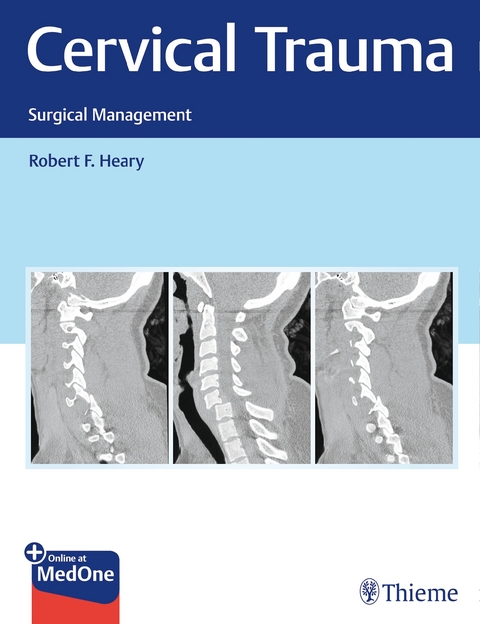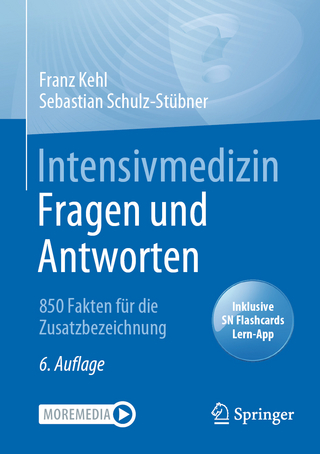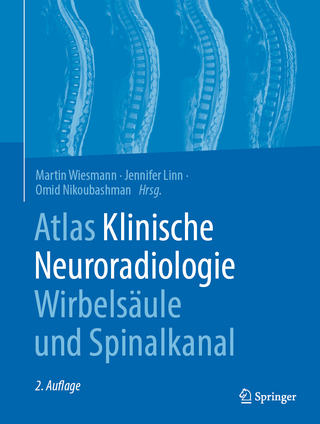
Cervical Trauma
Thieme (Verlag)
978-1-62623-853-4 (ISBN)
Understanding the clinical implications of cervical trauma requires thorough knowledge of the anatomy and physiology of the cervical spine. »Cervical Trauma: Surgical Management« by renowned spine surgeon Robert Heary and a cadre of prominent neurosurgical and orthopaedic spine experts is the most comprehensive, state-of-the-art resource available to date on this topic. The text begins with discussion of cervical anatomy and the pathophysiology of spinal cord injury (SCI), SCI classification systems, initial assessments in patients with cervical SCIs, and cranioskeletal traction, followed by injury-specific chapters.
Classification systems and management protocols developed over the last 40 years have enabled spine surgeons to work collaboratively with specialists in trauma surgery and critical care to provide optimal management of SCIs and attain improved long-term patient outcomes. This book covers a full spectrum of trauma-related conditions impacting the cervical spine and multidisciplinary interventions including minimally invasive surgery, neurointerventional techniques, reconstructive therapy with bone grafts or alternative stabilization methods, evidence-based medications, and SCI rehab.
Key Highlights
- Discussion of upper cervical injuries - from more prevalent trauma such as atlanto-occipital injuries, odontoid and hangman's fractures, and atlantoaxial subluxations - to uncommon injuries like atlantoaxial rotatory fixation
- Management of subaxial injuries in adults and children and cervical burst fractures
- Special topics including sport-related cervical spine injuries and return-to-play criteria, craniovertebral injuries in pediatric patients, and managing comorbidities such as congenital spinal stenosis and rheumatoid arthritis
- Pearls on handling potential complications and insightful guidance and rationales for choosing surgical interventions over conservative methods and vice versa
Neurosurgical and orthopaedic residents, veteran spine surgeons, and allied healthcare practitioners who treat patients with traumatic cervical spine conditions will benefit from reading this outstanding resource, cover-to-cover. It also provides an ideal go-to reference to consult in the ER when patients present with cervical trauma.
Robert F. Heary, MD, is Director, the Spine Center of New Jersey, and Professor of Neurological Surgery, Rutgers, The State University of New Jersey, Newark, New Jersey, USA.
Chapter 01: Anatomy of the Cervical Spine
Chapter 02: Classification of Spinal Cord Injury
Chapter 03: Pathophysiology of Spinal Cord Injury
Chapter 04: Initial Assessment (Including Imaging) of Cervical Spinal Cord Injury
Chapter 05: Cranioskeletal Traction for the Management of Trauma to the Cervical Spine
Chapter 06: Atlanto-Occipital Injuries
Chapter 07: Odontoid and Hangman's Fractures
Chapter 08: Management of Traumatic Atlantoaxial Subluxations
Chapter 09: Traumatic Atlantoaxial Rotatory Fixation
Chapter 10: Subaxial Cervical Trauma in the Adult Patient
Chapter 11: Subaxial Cervical Spine Trauma in the Pediatric Patient
Chapter 12: Cervical Burst Fractures
Chapter 13: Cervical Spine Trauma-Induced Vertebral Artery Injury
Chapter 14: Sport-Related Cervical Spine Injuries and Return-to-Play Criteria
Chapter 15: Craniovertebral Injuries in Pediatric Patients
Chapter 16: Penetrating Injuries to the Cervical Spine
Chapter 17: Cervical Spine Trauma in Patients with Congenital Spinal Stenosis
Chapter 18: Trauma in Patients with Rheumatoid Arthritis of the Cervical Spine
Chapter 19: Traumatic Cervical Myelopathy
Chapter 20: Minimally Invasive Spine Surgery
Chapter 21: Role of Neurointerventional Techniques in Cervical Trauma
Chapter 22: Bone Graft Options, Substitutes, and Harvest Techniques
Chapter 23: Non-operative Management and Treatment of Cervical Spine Injuries
Chapter 24: Rehabilitation after Spinal Cord Injury: Approaches and Caveats
Chapter 25: Clinical Trials Update: Where Do We Go From Here?
Chapter 26: Pharmacologic Treatment of Spinal Cord Injury
| Erscheinungsdatum | 29.03.2019 |
|---|---|
| Zusatzinfo | 102 Abb. |
| Verlagsort | New York |
| Sprache | englisch |
| Maße | 216 x 279 mm |
| Gewicht | 1 g |
| Einbandart | gebunden |
| Themenwelt | Medizinische Fachgebiete ► Chirurgie ► Neurochirurgie |
| Medizinische Fachgebiete ► Chirurgie ► Unfallchirurgie / Orthopädie | |
| Medizin / Pharmazie ► Medizinische Fachgebiete ► Notfallmedizin | |
| Medizin / Pharmazie ► Medizinische Fachgebiete ► Orthopädie | |
| Medizin / Pharmazie ► Medizinische Fachgebiete ► Sportmedizin | |
| Schlagworte | Atlanto-Occipital Injuries • Cervical Burst Fractures • Cranioskeletal Traction • Hangman's Fractures • Hangman’s Fractures • Sport-Related Cervical Spine Injuries and Return-t • Sport-Related Cervical Spine Injuries and Return-to-Play Criteria |
| ISBN-10 | 1-62623-853-7 / 1626238537 |
| ISBN-13 | 978-1-62623-853-4 / 9781626238534 |
| Zustand | Neuware |
| Informationen gemäß Produktsicherheitsverordnung (GPSR) | |
| Haben Sie eine Frage zum Produkt? |
aus dem Bereich


